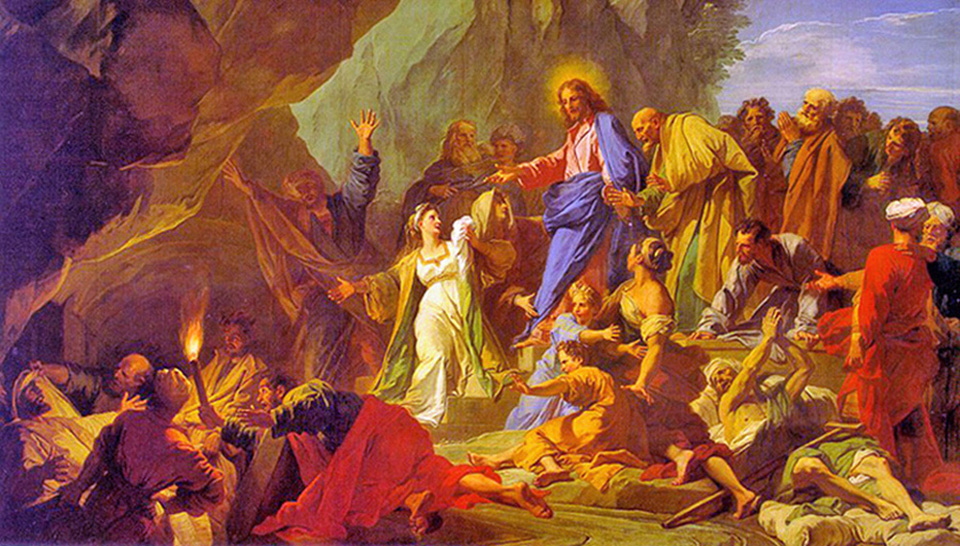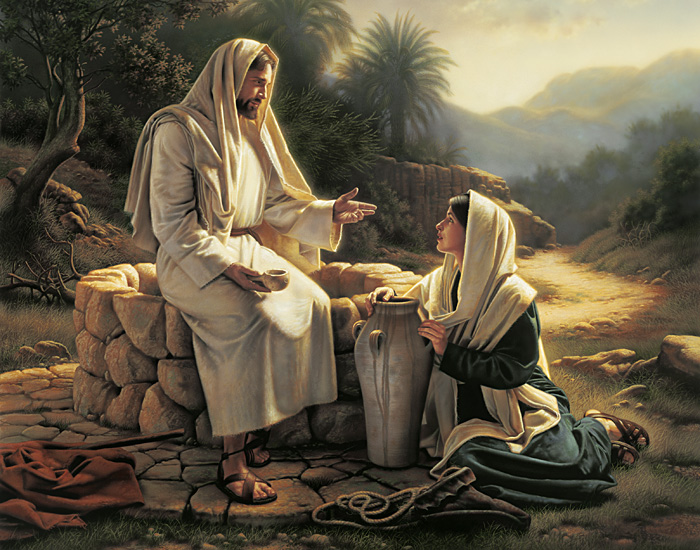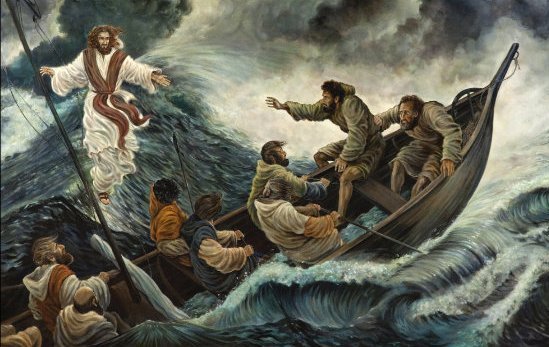
While the crowd was pressing in on Jesus and listening to the word of God, he was standing by the Lake of Gennesaret.
And he saw two boats by the lake; but the fishermen had gone out of them and were washing their nets.
Getting into one of the boats, which was Simon’s, he asked him to put out a little from the land.
And he sat down and taught the people from the boat.
And when he had ceased speaking, he said to Simon, “Put out into the deep and let down your nets for a catch.”
And Simon answered, “Master, we toiled all night and took nothing! But at your word I will let down the nets.”
And when they had done this, they enclosed a great shoal of fish; and as their nets were breaking,
they beckoned to their partners in the other boat to come and help them.
And they came and filled both the boats, so that they began to sink.
But when Simon Peter saw it, he fell down at Jesus’ knees, saying, “Depart from me, for I am a sinful man, O Lord.”
For he was astonished, and all that were with him, at the catch of fish which they had taken;
and so also were James and John, sons of Zebedee, who were partners with Simon.
And Jesus said to Simon, “Do not be afraid; henceforth you will become catchers of men.”
And when they had brought their boats to land, they left everything and followed him.
Gospel of Luke 5:1-11

Jesus Christ performed many miracles, demonstrating his power over nature and spirits, and thus confirming that the Kingdom of God is at hand (Mark 1:15). “Come, follow me, and I will make you fishers of men” (Matthew 4:19). Through the above miracle, Jesus recruited his first four Apostles – Peter, his brother Andrew, and James and John.
Hebrew Scripture, our Old Testament of the Bible, abounds in miracles, three famous ones being God’s creation of the universe (Genesis 1-2), God through Moses parting the Red Sea (Exodus 14:21-22), and the sun and moon standing still in Joshua 10:12-14. In a physical miracle, such as making the blind see, or walking on water, or calming a storm, the laws of the universe are suspended through divine intervention.
Jesus the Christ also performed moral miracles in the New Testament. In a moral miracle, such as forgiveness of sins or driving out demons, the blessing of Jesus purifies the soul. In Mark 2:1-12, Jesus performed a physical miracle, healing the paralytic, to demonstrate a moral miracle, the forgiveness of sins.
Only three miracles appear in all four Gospels – his own Resurrection (Matthew 28, Mark 16, Luke 24, and John 20), the greatest miracle of them all; the feeding of the 5000 through the multiplication of the loaves and fish, found in Matthew 14:13-21, Mark 6:30-44, Luke 9:10-17, and John 6:1-14; and, while different individuals are involved (see chart), Jesus heals the blind (Matthew 9:27-31, Mark 8:22-26, Luke 18:35-43, and John 9).

The miracle stories are an integral part of the Gospel narrative, as in the Gospel of Mark, where nearly half of Mark’s account of the public ministry of Jesus (Chapters 1-10) describes miracles. The ministry of Jesus is centered on the establishment of God’s imminent Kingdom, which ended the dominion of the evil one over the world, present ever since sin and death entered mankind. The miracles were Jesus’ chief weapon in the struggle with evil (Mark 3:22-27), the most direct being the exorcism of demons, which defeated the power of evil and liberated humanity. That is why a miracle is an act of power in the Synoptic Gospels, the Greek word being δύναμις, the origin of our English words dynamic and dynamite. John in his Gospel utilizes the word σημεῖον (sign). The word τέρας (wonder) is mainly found in the Acts of the Apostles. The Gospels record twelve miracles in Capernaum, more than anywhere else in the Holy Land.
What is striking is that Jesus performs those miracles that, referring to Isaiah 29:18-19 and 35:3-6, were prophecies of the Messiah. John the Baptist sent his disciples to ask Jesus or Yeshua – “Are you the one who is to come, or should we expect another?” Jesus reassures John and his disciples by naming the miracles of the Savior: “the blind receive their sight, the lame walk, the lepers are cleansed, the deaf hear, the dead are raised, and the poor have good news preached to them” (Matthew 11:3-5). Jesus not only heals the leper but also instructs the leper to show himself to the priest in observance of Leviticus 13-14 (Matthew 8:1-4).

Jesus Christ raised three from the dead: the daughter of Jairus the synagogue official (Mark 5:22-24, 35-43), the son of the widow of Nain (Luke 7:11-17), and Lazarus on the fourth day (John 11).
The symbolic element of the miracle becomes primary in the Gospel of John. For example, in John 9, the interest in giving sight to the man born blind is not just the gift of sight, but in his coming to the spiritual insight of faith, an insight made possible by Jesus, the Light of the world. The Gospel of John enumerates seven signs of Jesus: he turns water into wine at the wedding feast of Cana (2:1-12); the healing of an official’s son in Capernaum (4:43-54); the healing of a paralytic on the sabbath by the pool at Bethesda in Jerusalem (5:1-47); the feeding of the five thousand (6:1-14) before the Bread of Life discourse; walking on water (6:16-21); the healing of a man born blind (9:1-41); and the raising of Lazarus (11:1-57). John also records three appearances of Christ to his disciples following his Resurrection.
The miracles of the Multiplication of the Loaves and Fish and the Wedding Feast of Cana serve as a prelude to the miracle of the Institution of the Eucharist at the Last Supper of our Lord, and the giving of Communion in our Churches throughout the world!
The third millennium is more receptive to miracles as compared to the skepticism of the post-Enlightenment. Case records of inexplicable cures from cancer, the healings of Guadalupe, Mexico, Lourdes, France, and Fatima, Portugal, and reports of near-death experiences have produced an openness to the miraculous.
While Christ Jesus performed innumerable healings and exorcisms (Matthew 8:16-17, Mark 1:32-34, Luke 6:17-19), the following chart lists specific miracles of Jesus Christ during his public ministry, before his Resurrection:

| The Miracles of Jesus Christ | ||||
| Miracle | Matthew | Mark | Luke | John |
| Healing the possessed man in Capernaum | 1:21-28 | 4:31-37 | ||
| Healing of Peter’s Mother-in-law | 8:14-15 | 1:29-31 | 4:38-39 | |
| Cleansing of a Leper | 8:1-4 | 1:40-45 | 5:12-16 | |
| Turning Water into Wine at Cana | 2:1-11 | |||
| The Miraculous Catch of Fish | 5:1-11 | |||
| Healing of a Paralytic | 9:1-8 | 2:1-12 | 5:18-26 | |
| Cure of the Man with a Withered Hand | 12:9-14 | 3:1-6 | 6:6-10 | |
| Healing of Official’s Son in Capernaum | 4:43-54 | |||
| Healing of Centurion’s Servant | 8:5-13 | 7:2-10 | ||
| Raising of Widow’s Son at Nain | 7:11-17 | |||
| Calming of the Storm at Sea | 8:23-27 | 4:35-41 | 8:22-25 | |
| Cure of the Gerasene Demoniac | 8:28-34 | 5:1-20 | 8:26-39 | |
| Healing of a Paralytic in Jerusalem | 5:1-18 | |||
| Cure of Woman afflicted with Hemorrhage | 9:20-22 | 5:25-34 | 8:43-48 | |
| Raising of Jairus’ daughter | 9:23-26 | 5:35-43 | 8:49-56 | |
| Healing Two Blind Men in Nazareth | 9:27-31 | |||
| Healing A Possessed Mute | 9:32-34 | |||
| Feeding the 5000 | 14:13-21 | 6:34-44 | 9:10-17 | 6:1-14 |
| Walking on Water | 14:22-33 | 6:44-52 | 6:16-21 | |
| Healings at Gennesaret | 14:34-36 | 6:53-56 | ||
| Cure of Syro-Phoenician’s Daughter | 15:21-28 | 7:24-30 | ||
| Healing of Deaf-Mute | 7:31-37 | |||
| Feeding the 4000 | 15:32-39 | 8:1-9 | ||
| Restores Sight to the Blind Man of Bethsaida | 8:22-26 | |||
| Healing of a Man Born Blind in Jerusalem | 9:1-41 | |||
| Casting Out of a Dumb Demon | 17:14-21 | 9:14-29 | 9:37-43 | |
| Healing a Possessed Crippled Woman | 13:11-17 | |||
| Healing of A Man with Dropsy | 14:1-6 | |||
| Cleansing of Ten Lepers | 17:11-19 | |||
| Healing the Blind at Jericho | 20:29-34 | 10:46-52 | 18:35-43 | |
| Healing of Servant’s Ear during Arrest | 22:50-51 | |||
| The Raising of Lazarus | 11:1-44 | |||
| The Lord’s Supper | 26:26-30 | 14:22-26 | 22:19-20 | |



